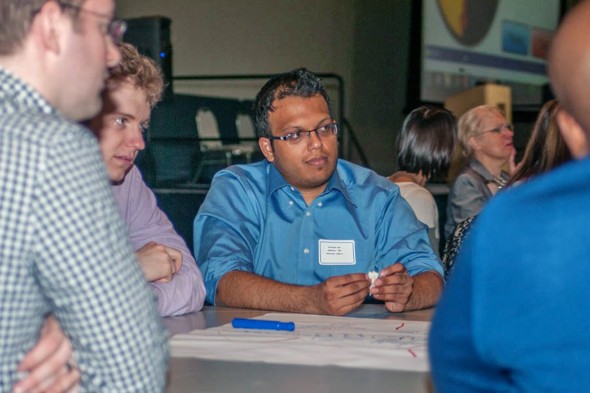Health students learn value of working together to help patients

Medical student Hariharan Iyer works with his team to improve patient care at the Interprofessional Education Immersion Day. Photo: Cristobal David Mora
More than 1,000 UIC students learned the increasing importance of collaboration in medical care during the second annual Interprofessional Education Immersion Day.
Students from 10 graduate and undergraduate departments and 60 faculty members gathered at the UIC Forum March 19 to find solutions for providing better patient care and reducing health care costs.
The event paired diverse students with faculty from different departments — from medicine to social work and nursing to physical therapy — to form collaboration health care teams.
“We all depend on each other so much more now,” medical student Meg Parilla said.
“Even as a student, I see the need to talk to the nursing staff and pharmacists much more and this event has shown me the underlying need to better that communication for the patients.”
The event began with an activity exploring the similarities between the fields. Students described their contributions to the overall patient experience and charted the similarities.
“We don’t do the same thing; we all have our specialties,” said Jeanne McCoy, clinical assistant professor of physical therapy. “This is to show the overlap and the redundancy of our work and to begin the discussion on how we pull our work together into making a better game plan for patient care.”
The teams watched an emergency situation video and explored ways to improve the overall patient experience.
“Social work is more recognized working with clients. Today we do all the work outside of the medicine,” said Mary Meckas, graduate student in social work. “We are responsible for the coordination between services and home care and our goal is to lessen readmissions and help with the emotional burdens of health care.”
UIC offers urban and rural medical programs, which train professionals on critical care issues facing all communities.
“It’s so helpful to hear what is happening now and how we can adapt our learning to better the new age of medical care in America,” medical student David Post said.
